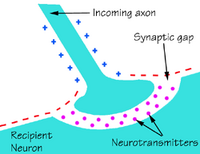Biological causes
Genetic factors
- Heredity - The tendency to develop depression may be inherited; there is some evidence that this disorder may run in families. A 2004 press release from the National Institute of Mental Health declares "major depression is thought to be 40-70 percent heritable, but likely involves an interaction of several genes with environmental events." [1]
- Main article: Genetic factors in depression

Brain chemicals called neurotransmitters allow electrical signals to move from the axon of one nerve cell to the neuron of another. A shortage of neurotransmitters impairs brain communication.
Neurochemical factors
- Neurochemical There may be changes or imbalances in chemicals that transmit information in the brain, called neurotransmitters. Many modern antidepressant drugs attempt to increase levels of certain neurotransmitters, such as serotonin and norepinephrine. Although the causal relationship is unclear, it is known that antidepressant medications can relieve certain symptoms of depression, although critics point out that the relationship between serotonin, SSRIs, and depression usually is typically greatly oversimplified when presented to the public (see here).
- Main article: Neurochemistry of depression
Neuroanatomy and depression
- Neuroanatomy Recent research has suggested that there may be a link between depression and neurogenesis of the hippocampus.
- Main article: Neuroanatomy of depression
Endocinology factors
- Hormonal factorsThe levels of hormones, the chemical messengers in the body that help regulate metabolism, have been linked to depression
- Main article: Endocrinology in depression
Physical sex differences
- Main article: Physical sex differences and depression
Medical conditions and depression
- Medical conditions – Certain illnesses, including cardiovascular disease[1], hepatitis, mononucleosis, hypothyroidism, and organic brain damage caused by degenerative conditions such as Parkinson disease or by traumatic blunt force injury may contribute to depression, as may certain prescription drugs such as birth control pills and steroids. Gender dysphoria can also cause depression.
- Main article: Depression and physical illness
Physiological functioning and depression
The activity of various physiological processes are also associated with depression:
- Depression, sleep and the circadian rhythm
Nutrition and depression
- The increase in depression in industrialised societies has been linked to diet, particularly to reduced levels of omega-3 fatty acids in intensively farmed food and processed foods.
- Main article: Nutrition and depression
Drug abuse and depression
- Alcohol and other drugs – Alcohol can have a negative effect on mood, and misuse of alcohol, benzodiazepine-based tranquilizers, sleeping medications and recreational drugs can all play a major role in the length and severity of depression.
- Main article: Drug abuse and depression
See also
Bibliography
Key texts – Books
Additional material – Books
Key texts – Papers
- ↑ Manev, R, Manev H (2004). 5-Lipoxygenase as a putative link between cardiovascular and psychiatric disorders. Critical Reviews in Neurobiology 16 (1�2): 181�6.
Additional material - Papers
External links